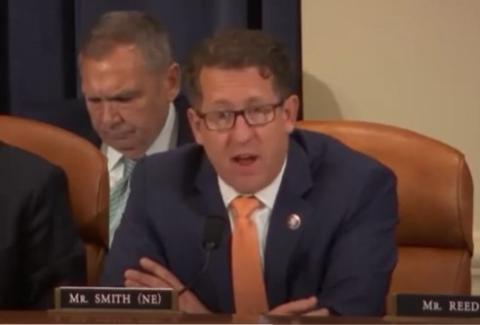Smith: Economic Opportunity for Every American is What This Country is All About
Washington, D.C. – Today, Rep. Adrian Smith (R-NE) spoke at a House Ways and Means Committee hearing about policies to support American families. He also questioned witness Alfred Ortiz, President and CEO of Job Creators Network, about how Democrat-led policies have made it harder for job creators to hire employees.
Watch the full exchange here.

Remarks as Prepared for Delivery
Thank you to our witnesses. I appreciate the Chairman calling this hearing.
While I may not agree with every point of analysis and policy recommendation from our witnesses today, I appreciate hearing their perspectives.
If we sat down for a conversation about economic opportunity, we would find our goals are the same: for every American to have a chance at a better life for themselves and their families, no matter where they live or what background they come from. That is, after all, what this country is all about.
For the purposes of today's hearing I would like to focus on two kitchen-table issues where Democrat proposals should be particularly troubling to working families, and where Republicans have solutions to meet their real, day-to-day needs.
First and foremost, we want every American to have access to a good job. Right now there are more job openings in our economy than job seekers – a recipe for rising wages.
In her testimony, Dr. Rojas singled out manufacturing as an employment sector where Black Americans have lagged since the 1990s. There are currently more than 800,000 manufacturing job openings in the U.S., and we should be doing more to fill them.
While Democrats have focused their efforts on paying people to stay home, worsening our supply chain and inflation crises, Republicans have been working to connect Americans on the sidelines of our economy with opportunities.
When I was Chair of the Human Resources Subcommittee we first introduced the JOBS for Success Act.
Back in the 90s, welfare reform was effective in getting millions of Americans into the workforce and reducing child poverty, but that was over two decades ago. Our country does not look or work the same, and we must take steps to connect Americans from all walks of life with adequate opportunity.
States passively telling people to work isn't enough. The JOBS for Success Act would require states to work one-on-one with TANF beneficiaries to actively connect them with employers, get them started in a good job, and provide them greater support to address challenges like child care and transportation. This will help keep employees working, ensuring they can access opportunities to earn raises and promotions.
And once you are working, the Child Tax Credit Republicans doubled in tax reform provides more economic help for families.
We all want every parent to have access to high quality, affordable child care that meets their needs.
Unfortunately, Democrats' child care proposal limits options for families around the country by only providing assistance to families using government-approved, facility-based care not located at a religious institution.
Seventy percent of child care is currently provided by a relative, in home-based care, or through a religious-based child care provider.
That means seventy percent of families utilizing care right now would be unable to use assistance at their current provider.
Simply put, the structure of Democrats' program would only worsen some of the disparities they claim to want to address.
Center-based care may be a great option for 9-5 office workers, but it's generally unavailable for parents working second or third shift.
Further, data show whites with graduate or professional degrees are the predominant users of center-based care, while Blacks and Hispanics are likelier to use care excluded from Democrats' program.
Instead of mandates, we should focus on ways to truly improve access to care – to work together on bipartisan solutions to expand access in places with greatest need, provide technical assistance to new providers of all types, and ensure states can use existing dollars to help parents stay in the workforce.